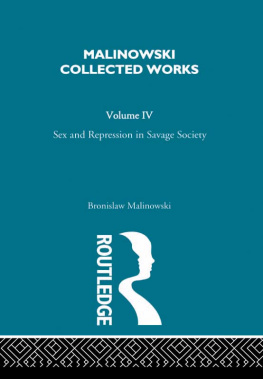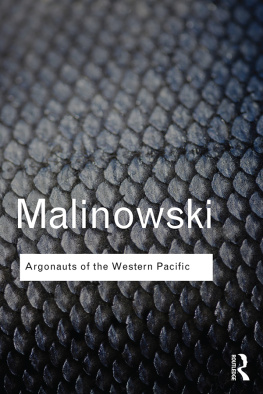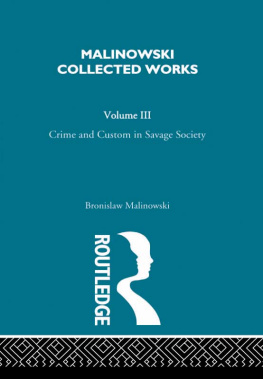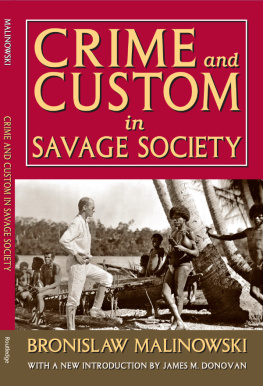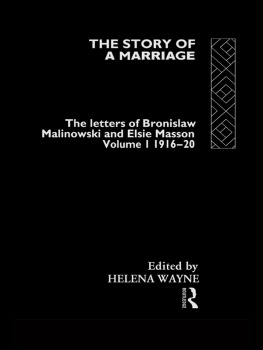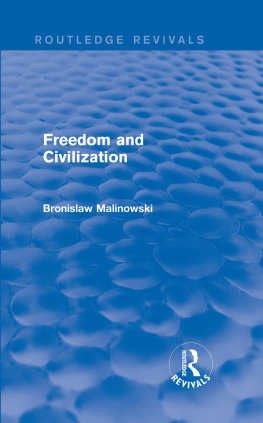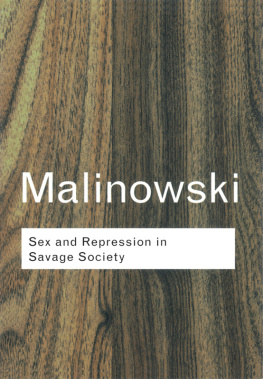Malinowski - Sex and Repression in Savage Society
Here you can read online Malinowski - Sex and Repression in Savage Society full text of the book (entire story) in english for free. Download pdf and epub, get meaning, cover and reviews about this ebook. publisher: Taylor & Francis (CAM), genre: Home and family. Description of the work, (preface) as well as reviews are available. Best literature library LitArk.com created for fans of good reading and offers a wide selection of genres:
Romance novel
Science fiction
Adventure
Detective
Science
History
Home and family
Prose
Art
Politics
Computer
Non-fiction
Religion
Business
Children
Humor
Choose a favorite category and find really read worthwhile books. Enjoy immersion in the world of imagination, feel the emotions of the characters or learn something new for yourself, make an fascinating discovery.
- Book:Sex and Repression in Savage Society
- Author:
- Publisher:Taylor & Francis (CAM)
- Genre:
- Rating:5 / 5
- Favourites:Add to favourites
- Your mark:
- 100
- 1
- 2
- 3
- 4
- 5
Sex and Repression in Savage Society: summary, description and annotation
We offer to read an annotation, description, summary or preface (depends on what the author of the book "Sex and Repression in Savage Society" wrote himself). If you haven't found the necessary information about the book — write in the comments, we will try to find it.
Sex and Repression in Savage Society — read online for free the complete book (whole text) full work
Below is the text of the book, divided by pages. System saving the place of the last page read, allows you to conveniently read the book "Sex and Repression in Savage Society" online for free, without having to search again every time where you left off. Put a bookmark, and you can go to the page where you finished reading at any time.
Font size:
Interval:
Bookmark:
COLLECTED WORKS
VOLUME I
Malinowski Among the Magi
VOLUME II
Argonauts of the Western Pacific
VOLUME III
Crime and Custom in Savage Society
VOLUME IV
Sex and Repression in Savage Society
VOLUME V
The Father in Primitive Psychology
Myth in Primitive Psychology
VOLUME VI
The Sexual Life of Savages in North-Western Melanesia
VOLUME VII
Coral Gardens and Their Magic I
VOLUME VIII
Coral Gardens and Their Magic II
VOLUME IX
A Scientific Theory of Culture and Other Essays
VOLUME X
Man and Culture
Edited by Raymond Firth
MALINOWSKI
COLLECTED WORKS
VOLUME IV
SEX AND REPRESSION IN SAVAGE SOCIETY
Bronislaw Malinowski

First published 1927 by Kegan Paul, Trench, Trubner & Co. Ltd
Reprinted 2002 by Routledge
2 Park Square, Milton Park, Abingdon, Oxon OX14 4RN
Simultaneously published in the USA and Canada
by Routledge
270 Madison Avenue, New York, NY 10016
Routledge is an imprint of the Taylor & Francis Group
Typeset in Times New Roman by
Keystroke, Jacaranda Lodge, Wolverhampton
Printed and bound in Great Britain by
Antony Rowe Ltd, Chippenham, Wiltshire
All rights reserved. No part of this book may be reprinted or reproduced or utilised in any form or by any electronic, mechanical, or other means, now known or hereafter invented, including photocopying and recording, or in any information storage or retrieval system, without permission in writing from the publishers.
British Library Cataloguing in Publication Data
A catalogue record for this book is available from the British Library
Library of Congress Cataloging in Publication Data
A catalog record for this book has been requested
ISBN 0415216710 (set)
ISBN 0415262461 (volume IV)
Publisher's Note
The publisher has gone to great lengths to ensure the quality of this reprint but points out that some imperfections in the original book may be apparent.
Printed and bound by Antony Rowe Ltd, Eastbourne
Sex and Repression in Savage Society
By
BRONISLAW MALINOWSKI
LONDON
KEGAN PAUL, TRENCH, TRUBNER & CO., LTD.
NEW YORK: HARCOURT, BRACE & COMPANY, INC.
1927
TO
MY FRIEND
PAUL KHUNER
New Guinea, 1914, Australia, 1918,
South Tyrol, 1922.
T HE doctrine of psycho-analysis has had within the last ten years a truly meteoric rise in popular favour. It has exercised a growing influence over contemporary literature, science, and art. It has in fact been for some time the popular craze of the day. By this many fools have been deeply impressed and many pedants shocked and put off. The present writer belongs evidently to the first category, for he was for a time unduly influenced by the theories of Freud and Rivers, Jung, and Jones. But pedantry will remain the master passion in the student, and subsequent reflection soon chilled the initial enthusiasms.
This process with all its ramifications can be followed by the careful reader in this little volume. I do not want, however, to raise expectations of a dramatic volte-face. I have never been in any sense a follower of psycho-analytic practice, or an adherent of psycho-analytic theory; and now, while impatient of the exorbitant claims of psycho-analysis, of its chaotic arguments and tangled terminology, I must yet acknowledge a deep sense of indebtedness to it for stimulation as well as for valuable instruction in some aspects of human psychology.
Psycho-analysis has plunged us into the midst of a dynamic theory of the mind, it has given to the study of mental processes a concrete turn, it has led us to concentrate on child psychology and the history of the individual. Last but not least, it has forced upon us the consideration of the unofficial and unacknowledged sides of human life.
The open treatment of sex and of various shameful meanesses and vanities in manthe very things for which psycho-analysis is most hated and reviledis in my opinion of the greatest value to science, and should endear psycho-analysis, above all to the student of man ; that is, if he wants to study his subject without irrelevant trappings and even without the fig leaf. As a pupil and follower of Havelock Ellis, I for one shall not accuse Freud of pan-sexualism however profoundly I disagree with his treatment of the sex impulse. Nor shall I accept his views under protest, righteously washing my hands of the dirt with which they are covered. Man is an animal, and, as such, at times unclean, and the honest anthropologist has to face this fact. The student's grievance against psycho-analysis is not that it has treated sex openly and with due emphasis, but that it has treated it incorrectly.
As to the chequered history of the present volume, the first two parts were written much earlier than the rest. Many ideas laid down there were formed while I was engaged in studying the life of Melanesian communities on a coral archipelago. The instructions sent to me by my friend Professor C. G. Seligman, and some literature with which he kindly supplied me, stimulated me to reflect on the manner in which the Oedipus complex and other manifestations of the unconscious might appear in a community founded on mother-right. The actual observations on the matrilineal complex among Melanesians are to my knowledge the first application of psychoanalytic theory to the study of savage life, and as such may be of some interest to the student of man, of his mind and of his culture. My conclusions are couched in a terminology more psycho-analytic than I should like to use now. Even so I do not go much beyond such words as complex and repression, using both in a perfectly definite and empirical sense.
As my reading advanced, I found myself less and less inclined to accept in a wholesale manner the conclusions of Freud, still less those of every brand and sub-brand of psycho-analysis. As an anthropologist I feel more especially that ambitious theories with regard to savages, hypotheses of the origin of human institutions and accounts of the history of culture, should be based on a sound knowledge of primitive life, as well as of the unconscious or conscious aspects of the human mind. After all neither group-marriage nor totemism, neither avoidance of mother-in-law nor magic happen in the unconscious; they are all solid sociological and cultural facts, and to deal with them theoretically requires a type of experience which cannot be acquired in the consulting room. That my misgivings are justified I have been able to convince myself by a careful scrutiny of Freud's Totem and Taboo, of his Group-Psychology and the Analysis of the Ego, of Australian Totemism by Rheim and of the anthropological works of Reik, Rank, and Jones. My conclusions the reader will find substantiated in the third part of the present book.
In the last part of the book I have tried to set forth my positive views on the origins of culture. I have there given an outline of the changes which the animal nature of the human species must have undergone under the anomalous conditions imposed upon it by culture. More especially have I attempted to show that repressions of sexual instinct and some sort of complex must have arisen as a mental by-product of the creation of culture.
The last part of the book, on Instinct and Culture, is in my opinion the most important and at the same time the most debatable. From the anthropological point of view at least, it is a pioneering piece of work; an attempt at an exploration of the no-specialist's-land between the science of man and that of the animal. No doubt most of my arguments will have to be recast, but I believe that they raise important issues which will sooner or later have to be considered by the biologist and animal psychologist, as well as by the student of culture.
Font size:
Interval:
Bookmark:
Similar books «Sex and Repression in Savage Society»
Look at similar books to Sex and Repression in Savage Society. We have selected literature similar in name and meaning in the hope of providing readers with more options to find new, interesting, not yet read works.
Discussion, reviews of the book Sex and Repression in Savage Society and just readers' own opinions. Leave your comments, write what you think about the work, its meaning or the main characters. Specify what exactly you liked and what you didn't like, and why you think so.

